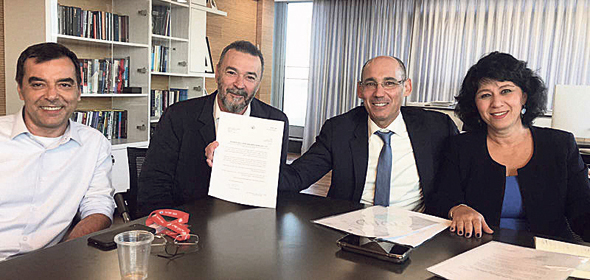Israel’s New Digital Bank: not yet Operational, Already Looking for Exceptions
In September, the Bank of Israel greenlit Marius Nacht and Amnon Shashua’s new digital banking venture
12:1631.12.19
An Israeli digital bank is currently being set up by Marius Nacht, co-founder of Check Point Software Technologies Ltd., and Amnon Shashua, co-founder and CEO of automotive chipmaker Mobileye, after receiving a green light in September from the Bank of Israel. The bank is forecasting it will reach its credit and deposit objectives of NIS 250 million (approximately $72.2 million) each within several months, according to one person familiar with the matter who spoke to Calcalist on condition of anonymity.
Last month, the Bank of Israel's banking supervision division published a memo draft titled “adjustments to regulations applied to a new bank,” intended to provide new banks with regulatory exemptions. As Nacht and Shashua’s bank is the first new bank to receive a license from the bank of Israel in decades, these regulations are currently basically applicable only to it. The general consensus among the Israeli banking industry is that the new bank will complicate matters too much. The sentiment was recently echoed by a ruling in Israel’s antitrust court, with the judge casting doubt on the digital bank’s ability to increase competition in the industry.

Amnon Shashua (left), Marius Nacht, Amir Yaron, Hedva Ber. Photo: Bank of Israel spokespersonצילום: דוברות בנק ישראל
The digital bank’s controlling shareholders and senior executives, however, have issues with the memo, according to the person familiar with the matter, and their critique reveals the bank’s ambitious objectives. The first is that the memo gives new banks a grace period of three years before they need to face far more stringent bureaucracy, but limits them to credit extension and a deposit balance of no more than NIS 250 million—a limit the digital bank intends to surpass within several months of operation, thereby revoking its exemptions. The bank is, therefore, asking for a three-year grace period regardless of its credit and deposits, or at least a more gradual increase in bureaucratic strain. The bank is also looking for exemptions regarding the proper conduct of banking business regulations, which were recently updated to include bans on encouraging private customers to take out credit and more exacting credit extension procedures.
Another demand, according to the person familiar with the matter, pertains to the bank’s chairman. Yehoshua (Shuki) Oren has been tapped for chairman, and the directors appointed by the controlling shareholders are expected to support him. The Bank of Israel has already suggested as part of the new regulation that new banks could appoint a controlling shareholder as temporary chairman, contrary to existing banks. However, the digital bank wants the Bank of Israel to sign off on regulations that will enable the controlling shareholders to appoint and remove the chairman without a board of directors’ decision, based on the claim that at banks with a control core, it is the de-facto controlling shareholder that decides the identity of the chairman.
Marius Nacht and Amnon Shashua have declined to respond to a request for comment.



